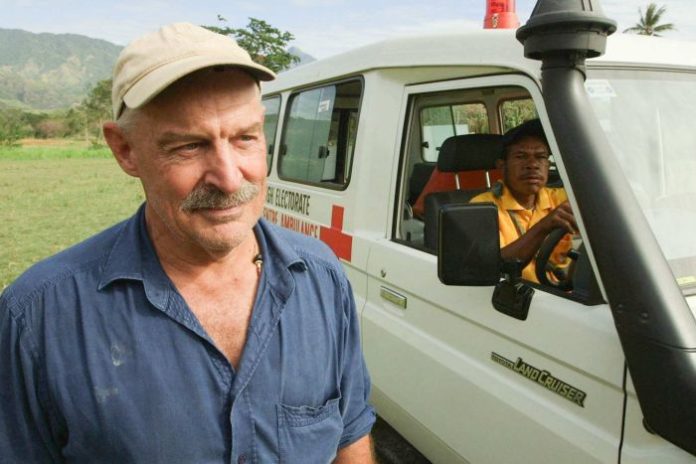
Dr Barry Kirby first travelled to Papua New Guinea in 1986 to take on a job building schools in remote Menyamya. During his stay at PNG, he saw people suffering for lack of basic health care and, nearing the end of the four-year posting, thought of becoming a medico, a doctor or a nurse and to be in a place like this and have a little clinic. He brushed aside the idea though, since he was 40, too late for a radical career change.
On one fateful night in 1990, he found a sick woman lying helplessly on the side of the road. She was dumped on the roadside by villagers who thought she was cursed. He took her to a nearby clinic, when he returned the next day to check up on her, he was told she was dead.
“That was the final straw,” he said. Having grown up in country New South Wales and struggling through high school, Kirby spent the next 12 years becoming a doctor.
He returned to Australia, relinquishing all he owned, and completed a premedical honors degree in Biomedical Science at Griffith University, Queensland in 1995. At 52, Barry Kirby, the carpenter from New South Wales’ Murwillumbah became a qualified doctor – he did his MBBS from the University of Papua New Guinea in 2002. Dr Kirby obtained his Australian Medical registration after passing the AMC examinations in 2007, while working as an ED doctor at Redlands Hospital, Brisbane. In 2008, Dr Kirby returned to PNG. In 2010, he joined the University of Papua New Guinea and successfully completed a Diploma in Obstetrics and Gynecology.
Dr Kirby then shifted to Alotau, Milne Bay Province, and his charity The Hands of Rescue Foundation started working with the Australian maternal health charity Send Hope Not Flowers to address maternal mortality in PNG. Women in PNG face the second highest maternal mortality rate in the Asia Pacific region after Afghanistan, with the women of Milne Bay facing a one in 20 chance of dying in childbirth.
To better understand the cause of maternal deaths and why mothers were still choosing village births, rather than going to health centres, he travelled in a little banana boat to remote islands in PNG and surveyed locals. The main reasons seemed to be remoteness and expense – a health centre delivery costs about $A5.
“In their own way they were telling me, ‘look we’re very poor, we don’t have nice clothes for the baby, we don’t have nice clothes for ourselves’. I thought gee, we’ve got to do something about this. I thought the only way to do this is to give you a gift, give you what you don’t have,” he said.
And that’s when he came up with the idea of the ‘Baby Bundles’ — cotton nappies, a blanket, sanitary supplies for the mother and baby clothes wrapped in a plastic baby bath — to encourage pregnant women and their partners to seek antenatal care and give birth in a medical centre rather than at home in the village. It’s these baby baths full of goodies that are making the difference.

“We went and bought a big baby dish and we filled it up with baby nappies and nappy for mother, pants, bed sheets, toilet paper, oil and powder for the baby, singlet’s and pants for the baby. We’ve put out 2,500 of these bundles. So there is a model out there that does work for Papua New Guinea.”
The bundles cost about $A28 each and include the $A5 equivalent cost of a health centre delivery as well as money for food while the mother is away from her village. Send Hope Not Flowers provided pilot funding for 200 baby bundles, but given the program’s almost immediate impact on the death rate this has been extended to more than 1000, and donors are keen to see this support continue. The Australian donors have also provided emergency obstetric training across eight health centres and supplied them with obstetric emergency kits. Women who have delivered are offered free contraception counselling and contraceptive implants.
A recent peer-reviewed medical study, co-authored by four doctors including Canberra Obstetrician Professor Steve Robson, showed Dr Kirby’s ‘Baby Bundles’ has resulted in 80% increase in the number of mothers receiving medical assistance during labour. His simple and cost-effective initiative has lowered the maternal death rate by a staggering 78%.

“This study shows how a relatively cheap and simple idea can translate to outstanding survival rates for pregnant women in a country where most families can, at some point, expect to lose a mother, sister, aunt or daughter to childbirth,” Professor Robson, who is also vice president of the Royal Australian and New Zealand College of Obstetricians and Gynecologists said.
At the 10 health centres servicing Milne Bay Province, supervised deliveries have increased from 845 a year in 2012 to 1449 in 2014. The Sehulea health centre has seen a 158% increase in supervised deliveries (to 155 deliveries) while the Wataluma health centre has seen a 188% increase (to 98 deliveries) over that period.
“We are so happy this is working. We listened to what mothers were saying to us and we responded, although at times it seemed like a crazy idea. It is a team effort right from the pockets of generous people in Australia through Send Hope Not Flowers into the hands of these PNG women and they have said ‘Yes! Thank you!’ Finally, finally our maternal death rate is coming down, at least in our backyard, and we should all feel happy about that,” Dr Kirby said.

Dr Kirby and his team hop between islands handling emergencies and routine births. They train up locals in the basics of midwifery. They distribute hundreds of life saving baby bundles enticing expectant mothers to trek down from remote mountain villages into the community health centres where they can have a safe birth.
Dr Barry or Dr Dim Dim (white people in local language), now 64, wants to pass on what he’s learned to others. Emergency nurse Kila Koupere is making this journey for the first time. “At the end of the day when I can’t do this any longer, it’s people like Kila that are going to take this forward. You know this is a PNG problem and we want to come up with PNG solutions and we want PNG people doing this. You know I’m limited now. I’m sort of almost dinosaur stage and so… women like Kila have got to take over,” he said.
This Article (Meet The Australian Carpenter Who Sold Everything He Owned To Become A Doctor – To Save Lives In Papua New Guinea [Investigative]) is free and open source. You have permission to republish this article under a Creative Commons license with attribution to the author and AnonHQ.com.




